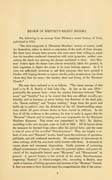
[p. 3]
REVIEW OF WHITNEY'S RECENT HISTORY.
The following is an excerpt from Whitney's recent history of Utah, published in 1916.
"The slain emigrants at (Mountain Meadow) cannot, of course, speak for themselves, either in denial or admission of the truth of these charges. But there have always been proxies who were more than willing to assert that the travelers conducted themselves with strict propriety, neither committing the deeds nor uttering the threats attributed to them. Anti-Mormon' writers upon the theme have almost invariably taken this ground, in their eagerness to depict the crime in its most hideous aspects. As if it were not sufficiently atrocious to suit their purpose, they have painted it blacker still, hoping thereby to injure, not the guilty perpetrators, but those whom they hate far more—the leaders, dead and living, of the 'Mormon' Church. *
The note there referred to is as follows *The latest attempt of this kind is by R. N. Baskin of Salt Lake City. As late as the year 1914—practically the present hour—when the ancient bitterness between "Mormons" and "Gentiles" has so far abated that they can affiliate socially, politically, and in business, as never before, this Bourbon of the dead past, who "learns nothing" and "forgets nothing," drags from the grave and holds up to public's view the skeletons of the old blood-curdling sensations which all good citizens desire to have buried in oblivion. In the face of all the evidence to the contrary, he tries to make it appear that the "Mormon" Church and its leading men were responsible for the Mountain Meadows Massacre. That crime was committeed in 1857; Mr. Baskin, according to his own account, came to Utah in 1865. All he knows about the massacre he learned from others after his arrival here; and the same is true of more of his so-called "Reminiscences." They are largely a rehash of stale anti-"Mormon" stories, based upon the testimony of apostates, jail-birds, and self confessed murderers. He complains of inaccuracies in other writings, while his own book fairly bristles with them. It abounds in coarse abuse and venomous vituperation. Under pretense of correcting alleged mistatements of history, he vents his personal spleen, and pours the vitriol of his implacable hatred upon "Mormons" and "Mormonism" in general. A special feature is the revival of the musty Munchausenism respecting "Danites" or blood-avengers who, according to Baskin, once made a business of killing apostates and enemies of the "Mormon" Church. It does not seem to have dawned upon his comprehension that if the extrav-
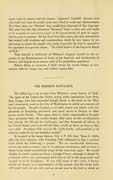
[p. 4]
agant tales he repeats and his frenetic "opinions" founded thereon were even half way true, he would never have lived to write any reminiscences. Had there been any "Danites" they would have disposed of him long ago. The mere fact that this inveterate "Mormon" hater is alive and well ought to be accepted as conclusive proof of the non-existence of such an organization, past or present. He has lived here fifty years, not only unmolested, but treated with kindness and consideration, which he now repays by endeavoring to injure the people who made it possible for him to append to his signature as a private citizen. "Ex-Chief Justice of the Supreme Bench of Utah."
That diatribe is indicative of Whitney's chagrin, caused by the exposure in my Reminiscences of Utah, of his duplicity and falsification of history, and impels me to answer each of his groundless aspersions.
Before doing so, however, I shall review his recent history in connection with his larger one, and further expose him.
THE MORMON BATTALION.
The following is an excerpt from Whitney's recent history of Utah: "An agent of the Lattery-day Saints, acting under instructions from Brigham Young, who had succeeded Joseph Smith at the head of the 'Mormon' community, went to the City of Washington to solicit government aid for his people. No gift of money or of other means was asked—only employment in freighting provisions and naval stores to Oregon or other points on the Pacific. That agent, Jesse C. Little, represented in his petition—presented after the exodus began—that many of his co-religionists had already left Illinois for California, and that thousands of others, in the United States and in the British Isles, would go there as soon as they were able. President Polk received Mr. Little kindly, and promised to do what he could do for the homeless people."
It is stated in his larger history, Vol. 1, P. 125, that, "Jesse C. Little, after his first interview with President Polk addressed to him a petition from which the following is quoted: 'We are true-hearted Americans, true to our native country, true to its glorious institutions, and we have a desire to go under outstretched wings of the American eagle. We would disdain to receive assistance from a foreign Power, although it should be proffered, unless, our government shall turn us off in this great crisis and compel us to be foreigners. If you will assist in this crisis, I hereby pledge my honor, as a representative of this people, that the whole body will stand ready at your call, and act as one man in the land to which we
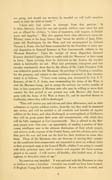
[p. 5]
are going, and should our territory be invaded we will hold ourselves ready to enter the field of battle.'"
I have only had access to excerpts from that petition. It is clear, however, from the one just quoted, soldiers were asked for and not, as alleged by whitney, "a force of teamsters, with wagons, to freight stores and supplies." This also appears from what afterwards occurred. Whitney states in his large history that "about the middle of June, Elder Little left Washington for the West, and was accompanied by Colonel Thomas L. Kane, who had been commanded by the President to carry special dispatches to General Kearney at Fort Leavenworth, relative to the 'Mormon Battalion.' Upon the receipt of those dispatches General Kearney detailed Captain Allen to confer with the 'Mormons' at their camp in Iowa. Upon arriving there he delivered to the leaders the circular which is hereinafter set out. What had previously transpired and that circular conclusively show that by the efforts of Mr. Little President Polk was induced to grant to the 'Mormons' the privilege of forming a battalion, for the purpose, and subject to the conditions contained in that circular, which is as follows. "I have come among you, instructed by Col. S. F. Kearney, of the U. S. Army, now commanding the Army of the West, to visit the Mormon Camp, and to accept the services for twelve months of four or five companies of Mormon men who may be willing to serve their country for that period in our present war with Mexico; this force to unite with the Army of the West at Santa Fe, and be marched thence to California, where they will be discharged.
"They will receive pay and rations and other allowances, such as other volunteers or regular soldiers receive, from the day they shall be mustered into srvice, and will be entitled to all comforts and benefits of regular soldiers of the Army, and when discharged, as contemplated, at California, they will be given gratis their arms and accoutrements, with which they will be fully equipped at Fort Leavenworth. This is offered to the Mormon people now—this year—an opportunity of sending a portion of their young intelligent men to the ultimate destination of their whole people, and entirely at the expense of the United States, and this advance party can thus pave the way and look out the land for their brethren to come after them. Those of the Mormons who are desirous of serving their country on the conditions here enumerated, are requested to meet me without delay at their principal camp at the Council Bluffs, whither I am going to consult with their principal men, and to receive and organize the force contemplated to be raised. I will receive all healthy, able bodied men, of from eighteen to forty-five years of age."
No coercion was intended. It was optional with the Mormons to raise or decline to raise a battalion. Certainly one would not have been formed, if Brigham Young had deemed it injurious. It was what he wanted, and
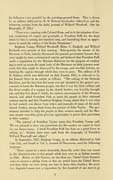
[p. 6]
his followers were grateful for the privilege granted them. This is shown by an address delivered by B. H. Roberts hereinafter referred to and the following excerpt from the daily journal of Wilford Woodruff. (See his Biography, P. 254.)
"There was a meeting with Colonel Kane, and in it the adoption of certain resolutions of respect and gratitude, to President Polk for the steps taken by him in arming five hundred men, and furnishing them an opportunity to reach the valleys of the Rocky Mountains."
Brigham Young, Wilford Woodruff, Heber C. Kimball, and Willard Richards were present at that meeting. Subsequently the masses of the Mormons in Utah, bitterly denounced the general government because they were taught by their ecclesiastical oracles and believed that President Polk made a requisition for the Mormon Battalion for the purpose of weakening to such an extent the main body of the Mormons on their journey westward, that they might be destroyed by the savage, and war-like Indians, inhabiting the regions through which they were to pass. The address of B. H. Roberts which was delivered on July Fourth, 1911, is referred to by the Deseret News in an article as follows. "The calling of the Mormon Battalion, and the fact that this event was not intended by the general government to harm the Mormon people, but that it was for their welfare and the direct results of a request by the church leaders, was forcibly brought out, and that Col. Jesse C. Little, the eastern representative of the Mormon church, had asked President Polk to assist the people in their enforced western march, and that President Brigham Young stated that it was what he had wanted, was shown from letters and journals of many of the early church leaders, among them being the journal of John Taylor. The government intended to help the people in their western march, and the Mormon people were thus given glorious opportunity to prove their patriotism to their country.
"The journal of President John Taylor states that President Young said, 'We are pleased to show our patriotism for the country we expect to have for our future home. I think President Polk has done us a great favor in calling us.' Similar facts were read from the biography of President Wilford Woodruff and others."
In September, 1857, Brigham Young, in an address delivered in Salt Lake City, and found in Vol. 5, Journal of Discourses, used the following language:
"There cannot he a more damnable, dastardly order than was issued by the Administration to this people while they were in an Indian country in 1846. Before we left Nauvoo, no less than two United States Senators came to receive a pledge from us that we would leave the United States, and then while we were doing our best to leave their borders, the poor, low, degraded cusses sent a requisition for five hundred of our men to go
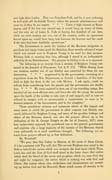
[p. 7]
and fight their battles. That was President Polk, and he is now weltering in hell with old Zachariah Taylor, where the present administrators will soon be, if they do not repent. * * * There is high treason in Washington, and if the law was carried out, it would hang up many of them, and the very act of James K. Polk in having five hundred of our men, while we were making our way out of the country, under an agreement forced upon us, would have hung him between the heavens and the earth if the laws had been faithfully carried out."
The Government to assist the balance of the Mormon emigrants to purchase and equip trains, paid the Battalion three months advanced wages which was turned over to Brigham Young to be used for that purpose. Whitney fails to mention that fact, although I stated it on indisputable authority in my Reminiscenes. His purpose in failing to do so is apparent.
The following is an excerpt from a sermon of Brigham Young contained in the Journal of Discourses, Vol. 2, P. 173. "While fleeing from our enemies another test of our fidelity was contrived by them for our destruction * * * acquiesced in by the government, consisting of a requisition from the War Department, to furnish a battalion of five hundred to fight for them in the war with Mexico. I ask again, could we refrain from considering both the people and the government our deadly foes * * * We were required to turn out of our traveling camps, five hundred of our most efficient men, and leave the old, the young, the women upon the hands of the residue to take care of and support, and in case we refused to comply with so unreasonable a requirement, we were to be deemed enemies of the Government, and fit for slaughter."
Those scandalous sermons and numerous others of like import and many more in which the government in other respects was bitterly censured, delivered by Brigham Young, and many of the apostles, bishops and elders of the Mormon church, and also the prayers offered up at the dedication of the St. George Temple on the 1st of January, 1877, show how malevolenty opposed, the priesthood was to the general government, and explains why a large majority of the laymen of the Mormon church were unfriendly to it until conditions changed.. The following are extracts from prayers offered up at that dedication.
By Woodruff:
"We pray thee Our Father in Heaven, in the name of Jesus Christ, if it be consistent with Thy will, that Thy servant Brigham may stand in the flesh to behold the nation which now occupies the land upon which Thou, Lord, has said the Zion of God shall stand in the latter days; that nation which shed the blood of the saints and prophets which cry unto God day and night for vengance; the nation which is making war with God and Christ; that nation whose sins, wickedness and abominations are ascending up before God and the Heavenly Hosts which causes all eternity to be
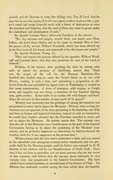
[p. 8]
pained, and the Heavens to weep like falling rain; Yea, 0 Lord, that he may live to see that nation, if it will not repent, broken in pieces like a potter's vessel and swept from the earth with a beson of destruction as were the Jaredites and Nephites, that the land of Zion may cease to groan under the wickedness and abomination of men."
By Apostle Lorenzo Snow, afterward President of the church:
"We, thy servants and people, stretch forth our hands unto Thee, Father, our Lord Jesus Christ, and in his name we beseech Thee to hear the prayer of thy servant Wilford Woodruff, which has been offered up in the first room of this house, and answereth it for this house and people."
By Apostle Brigham Young, Jr.:
"Hear and answer the prayers offered by thy apostles, Wilford Woodruff and Lorenzo Snow, that they may penetrate the ears of the Lord of Sabaoth."
Whitney, in his history, after garbling the facts by stating only such as suited his purpose of falsifying, asserts that "Such was the origin of the call for the Mormon Battalion—five hundred able bodied men, to assist the United States in its war with Mexico, coming at such a time, and embodying a proposition so different from the one submitted by Agent Little at Washington, it created at first some consternation. A force of teamsters, with wagons, to freight stores and supplies was one thing; a battalion of five hundred fighting men, quite another. In the midst of an exodus rife with dangers and hardships, the services of that number of men could ill be spared."
Whitney here insinuates that the privilege of raising the battalion was not granted to assist, but to injure the Mormons. Whitney when writing his histories was not ignorant of the facts pertaining to the battalion, and if he had been an honest and impartial historian, instead of such an insinuation, he would have frankly admitted that the President intended to assist, and not to injure the Mormons. He further asserts that "The extreme view that the call of this Battalion was a hostile move on the part of the General Government, having as its object the weakening of the 'Mormon' community, and its probable dispersion or destruction by Indians beyond the frontier, finds few if any supporters at the present time."
Whitney knows that the view above mentioned is false, and was caused by the untruthful and outrageous sermons before mentioned, and was generally held by the Mormon people, until its falsity was exposed by B. H. Roberts in his address and by my Reminiscences of Early Utah. Since then it has not been so prevalent, but yet many persons who are not aware of that exposure, still believe that the outrage above indicated, by that extreme view, was perpetrated by the General Government. The facts which I have stated constitute an essential part of the history of Utah. Yet Whitney has studiously avoided stating the facts which show the hostility
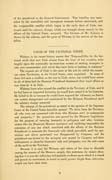
[p. 9]
of the priesthood to the General Government. That hostility was intensified by the untruthful and outrageous sermons before mentioned, and the irrepressible conflict which began in the early days of Utah, continued until the salutary change, which was brought about, mainly by the efforts of the Liberal Party, occurred. The fairness of Mr. Roberts is shown by his address, and the guile of Whitney by his version of the battalion.
CAUSE OF THE FACTIONAL STRIFE.
Whitney in his recent history asserts that "Responsibility for the factional strife that tore Utah almost from the hour of her creation, rests largely upon the essentially un-American system of sending strangers to rule over communities with which they have little or nothing in common."
The organic act of Utah is the same as the acts by which the numerous other Territories, in the United States, were organized. In none of them did such a conflict, as the one in Utah, occur, but would have arisen in all of them had the Mormon Priesthood dominated their local affairs as was done by it in Utah..
Whitney knew what caused the conflict in the Territory of Utah, and if he had been an impartial historian, he would have stated it in his histories. He failed to do so because he would have exposed the infamous un-American system inaugurated and maintained by the Mormon Priesthood until the salutary change occurred.
The attempt of the priesthood as stated in the opinion of the Supreme Court of the United States hereafter quoted: "To drive from the Territory all who were not connected with them (the Mormon sect) in communion and sympathy;" the pernicious acts passed by the Mormon Legislature for the purpose of securing immunity to polygamy and other heinious crimes like the Mountain Meadow massacre, and rendering impossible the execution of any law which interfered with the efforts of the Mormon Priesthood to maintain the theocratic rule which prevailed, until the pernicious acts above mentioned was disapproved by Congress, and the priesthood was forced by the stringent acts passed by Congress and their enforcement to abandon theocratic rule and polygamy, was the sole cause of the strife in the Territory.
Because it is easy for Whitney and others of his class to discredit among the masses of the Mormon people, this statement, by simply denying that it is true the following indisputable evidence upon which it is based and proves its correctness, is stated at much greater length than, otherwise, would not have been done.
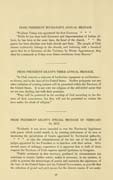
[p. 10]
FROM PRESIDENT BUCHANAN'S ANNUAL MESSAGE.
"Brigham Young was appointed the first Governor * * *
"While he has been both Governor and Superintendent of Indian Affairs, he has been at the same time, the head of the church. * * His power has been absolute over both church and State. The people of Utah almost exclusively belongs to the church, and believing with a fanatical spirit that he is Governor of the Territory by Divine Appointment, they obey his commands as if they were direct revelations from Heaven."
FROM PRESIDENT GRANT'S THIRD ANNUAL MESSAGE.
"In Utah remains a remnant of barbarism repugnant to civilization—to dcency, and to the laws of the United States. Neither polygamy nor any other violation of existing statutes will be permitted within the Territory of the United States. It is not with the religion of the self-styled saints that we are now dealing, but with their practices.
"They will be protected in the worship of God according to the dictates of their consciences, but they will not be permitted to violate the laws under the cloak of religion."
FROM PRESIDENT GRANT'S SPECIAL MESSAGE OF FEBRUARY 14, 1873.
"Evidently it was never intended to vest the Territorial legislature with power which would enable it, by creating judicatures of its own or increasing the jurisdiction of Courts appointed by Territorial authority, * * * to take the administration of the law out of the hands of judges appointed by the President or to interfere with their action. After several years of unhappy experience it is apparent that in both of these respects the Territory of Utah requires special lgislation by Congress.
"Public sentiment in that territory, produced by circumstances too notorious to require further notice, makes it necessary, in my opinion, in order to prevent the miscarriage of justice and maintain the supremacy of the laws of the United States and the Federal Government, to provide that the selection of grand and petit jurors for the district courts, if not under
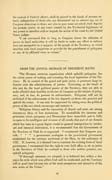
[p. 11]
the control of Federal officers, shall be placed in the hands of persons entirely independent of those who are determined not to enforce any act of Congress obnoxious to them, and also to pass some act which shall deprive the probate courts, or any court created by the Territorial legislature of any power to interfere with or impede the action of the court by the United States judges.
"I am convinced that so long as Congress leaves the selection of jurors to local authorities it will be futile to make any effort to enforce laws not acceptable to a majority of the people of the Territory, or which interfere with local prejudices or provide for the punishment of polygamy or any of its affiliated vices or crimes."
FROM THE ANNUAL MESSAGE OF PRESIDENT HAYES.
"The Mormon sectarian organization which upholds polygamy, has the whole power of making and executing the local legislation of the Territory. By its control of the grand and petit juries, it possesses large influence over the administration of justice. Exercising, as the heads of this sect do, the local political power of the Territory, they are able to make effective their hostility to the law of Congress on the subject of polygamy, and, in fact, do prevent its enforcements. Polygamy will not be abolished if the enforcement of the law depends on those who practice and uphold the crime. It can only be suppressed by taking away the political power of the sect which encourages and sustains it.
"Religious liberty and the separation of church and state, are among elementary ideas of free institutions. To re-establish the interests and principles which polygamy and Mormonism have imperiled, and to fully re-open to the intelligent and virtuous of all creeds, that part of our domain which has been in a great degree closed to general immigration by intolerant and immoral institutions, it is recommended that the Government of the Territory of Utah be re-organized. I recommend that Congress provide * * * a government analogous to the provisional government established for the Territory northwest of the Ohio, by the ordinance of 1787. If, however, it is deemed best to continue the existing form of local government, I recommend that the right to vote, hold office, or sit on juries in the Territory of Utah, be confined to those who neither practice, nor uphold polygamy.
"If thorough measures are adopted, it is believed that within a few years the evils which now afflict Utah will be eradicated, and the Territory will in good time become one of the most prosperous and attractive of the new states of the Union."
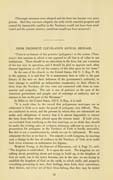
[p. 12]
(Thorough measures were adopted and the State has become very prosperous. Had they not been adopted, the evils which retarded progress and caused the lamentable conflict in the Territory would not have been eradicated and the present salutary conditions would not have occurred.)
FROM PRESIDENT CLEVELAND'S ANNUAL MESSAGE.
"There is no feature of this practice (polygamy) or the system (Theocracy) that sustains it, which is not opposed to all that is of value in our institutions. There should be no relaxation in the firm, but just execution of the law now in operation, and I should be glad to approve such other discreet legislation as will rid the country of this blot upon its fair fame."
In the case of the church vs. the United States, 136 U. S. Rep. P. 49, in the opinion, it is said that "It is unnecessary here to refer to the past history of the sect—to their defiances of the government's authority, to their attempt to establish an independent community, to their efforts to drive from the Territory all who were not connected with them in communion and sympathy. The tale is one of patience on the part of the American government and people, and of contempt of authority and resistance to law on the part of the Mormons."
In Miles vs. the United States, 103 U. S. Rep., it is said:
"It is made clear by the record that polygamous marriages are so celebrated in Utah as to make the proof of polygamy very difficult. They are conducted in secret, and the persons by whom they are solemnized are under such obligations of secrecy that it is almost impossible to extract the facts from them when placed upon the witness stand. If both wives are excluded from testifying to the first marriage, as we think they should be under the existing rules of evidence, testimony sufficient to convict in a prosecution for polygamy in the Territory of Utah is hardly attainable. But this is not a consideration by which we can be influenced. We must administer the law as we find it. The remedy is with Congress, by enacting such a change in the law of evidence in the Territory of Utah as to make both wives witnesses on indictments for bigamy.
Brigham Young, in the Journal of Discourses, vol. 4, Page 77, said: "The kingdom is established. It is upon the earth. The kingdom we are talking about, preaching about and trying to build up, is the kingdom of God on earth, not in the starry heavens, nor in the sun; we are trying to establish the kingdom of God on the earth, to which really and properly everything pertaining to men, their feelings, their faith, their convictions, their desires, and every act of their lives belong, that they may be sealed
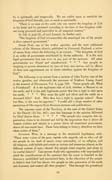
[p. 13]
by it spiritually and temporally. We are called upon to establish the Kingdom of God literally, just as much as spiritually.
"There is no man on the earth who can receive the kingdom of God in his heart and be governed according to the laws of that kingdom without being governed and controlled in all temporal matters."
In Vol. 6, page 23, of said Journal, he further said:
"The kingdom of God circumscribes the municipal law of the people in their outward government."
Orson Pratt, one of the twelve apostles, and the most celebrated scholar of the Mormon church, published in Liverpool, England, a series of essays from which the following is an extract: "The Kingdom of God is an order of government established by divine authority. It is the only legal government that can exist in any part of the universe. All other governments are illegal and unauthorized. * * * Any people attempting to govern themselves by laws of their own notion, and by officers of their own appointment are in direct rebellion against the Kingdom of God."
The following is an extract from a sermon of John Taylor, one of the twelve apostles, and afterwards the successor of Brigham Young, found in the Journal of Discourses, Vol. 5, page 149: "Some people ask, What is Priesthood? It is the legitimate rule of God, whether in Heaven or on the earth, and it is the only legitimate power that has a right to rule upon the earth. * * * Who owns the gold and silver and the cattle on a thousand hills? God. Who then has a right to appoint rulers? None but Him, or the man he appoints." I could add a large number of other quotations of like import from Mormon sermons and publications.
The supreme court of the Territory, in the case of the United States vs. the Church (15 Pac. 467), uses this language in the opinion delivered by Chief Justice Zane: * * * "The people who comprise this organization claim to be directed and led by the inspiration that is above all human wisdom and subject to a power above all municipal government, above all man-made laws These facts belong to history, therefore we have taken notice of them."
Governor West, in a message to the territorial legislature, said: "These many voices of the past, replete with anguish, ask us why—of all the people in our land of nearly every nationality, of no religion, and all religions, with beliefs and creeds as various and numerous almost, as the different nations of men—should this people stand singular and alone in its woeful history? Can anyone doubt who approaches with unprejudiced mind the considerations of the question that the cause is founded in the theocracy established and maintained here, in the education of the people to believe that God has chosen this people to take possession of the earth and dominate and control all other peoples? That through his priesthood
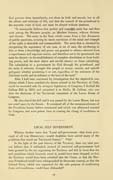
[p. 14]
God governs them immediately, not alone in faith and morals, but in all the affairs and relations of life, and that the council of the priesthood is the supreme voice of God, and must be obeyed without question.
"It necessarily follows that perfect and complete unity has and does exist among the Mormon people; an absolute oneness, without division and dissent. The unity in the State which comes from a fair discussion of public questions, securing by merit conviction of the mind and triumph of the right, is desirable and commendable. The unity that is obtained by recognizing the supremacy of one man, or set of men, the attributing to him or them a knowledge and power not granted to others—derived from a superhuman and supreme source, and therefore not to be questioned, but must be obeyed—is the establishment of complete absolutism in those holding power, and the most abject and servile slavery on those submitting. The submission to a government by God through his priesthood, and the unity it enforces, brought this people to accept, sustain, and uphold polygamy whether practicing it or not, regardless of the sentiment of the Christian world, and in defiance to the laws of the land."
After I had been convinced by investigation that the deplorable conditions which I have conclusively shown existed in the Territory of Utah, could be corrected only by stringent legislation of Congress, I drafted the Cullom Bill in 1869, and submitted it to Shelby M. Cullom, who was then the chairman of the Territorial committee of the Lower House of Congress.
He introduced the bill and it was passed by the Lower House, but was not acted upon by the Senate. It contained all of the recommendations of the Presidents herein before mentioned and which was afterward enacted by Congress, and were potent facts in causing the chang of conditions in Utah.
LOCAL SELF GOVERNMENT.
Whitney further states that "Local self-government—that basic principal of all true Democracy—would doubtless have solved many of the problems that vexed our Territorial history." Pish!
In the light of the past history of the Territory, does any sane person believe that if unlimited, instead of restricted self-government had been granted by the act organizing the Territory and left in force that the evil conditions which formerly vexed it, would have been changed, or that the Territory would have been admitted into the Union, or that the Mormon Priesthood would have relinquinshed its theocratic control, or that the Liberal Party, which was organized for the sole purpose of eradicating those evil conditions, would have disbanded?
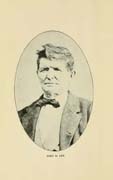
[p. unnumbered]
JOHN D. LEE
A black and white portrait of John D. Lee.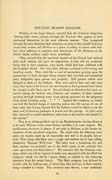
[p. 15]
MOUNTAIN MEADOW MASSACRE.
Whitney in his large history, asserted that the Arkansas emigrants, "During their entire journey through the Territory they appear to have conducted themselves in the most offensive manner. They swaggered through the town declaring their intention, as soon as they should have conveyed their women and children to a place of safety, to return with military force sufficient to complete such destruction of the Mormons as the United States soldiery might leave unfinished.
"They averred that the murdered leaders of the Church had received their tardy deserts, and gave the impression, if they did not positively boast, that in their company, were hands which had been reddened with the Prophet's blood. Nor were their offenses confiined to harrowing and insulting words. They acted like a band of marauders, preying upon the possessions of those through whose country they traveled and committed petty indignities upon person and property. Still greater crimes were charged to them by the Indians. They were said to have not only wantonly shot some of the braves, but were known to have poisened beef where the savages would likely get it. Several deaths attributed to this cause occurred among the Indians near Filmore, and numbers of their animals perished through drinking water from springs poisoned by the emigrants when about breaking camp. * * * Against this company, as stated, was laid the fearful charge of injecting poison into the carcass of one of their oxen, first having learned that the Indians would be likely to eat the meat, and of throwing packages of poison into the springs. In other ways they contrived to render themselves obnoxious to the settlers and hateful to the natives."
That is an infamous libel, and in my Reminiscences, having shown it to be such, Whitney in his recent history modifies it in some respects. His modification, however, is almost, if not quite as libelous, as his former accusations of the murdered emigrants. He admits that the Arkansas company was mainly made up of respectable and well to do people, but asserts "That along with them went a rough and reckless set of men calling themselves 'Missouri Wild Cats.' The latter were a boisterous lot, and their conduct was probably one of the chief causes of the calamity that came upon them and their betters." His assertion that the Arkansas company, which was led by Captain Fancher was associated with the Wild Cat company, which was led by Captain Dukes, is refuted by the following quotation from his recent history. "The Duke company was delayed by trouble with the Indians, one of whom they shot 'and two of their number being wounded in return. This occurred near Beaver, a new settlement
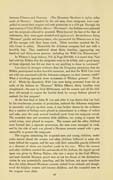
[p. 16]
between Filmore and Parowan. (The Mountain Meadows is eighty miles south of Beaver.) Attacked by the red men, these emigrants were compelled to corral their wagons and seek protection in a rifle pit. Through the intervention of Utah Militia officers—'Mormons'—the Indians were placated and the emigrants allowed to proceed. When beyond the last of the line of settlements, they were again attacked and again saved, the mediators being "Mormon" guides and interpreters, who pursuaded the Missourians to buy off the savages with their loose stock. These travelers reached the Pacific Coast in safety. Meanwhile the Arkansas company had met with a horrible fate. They numbered about thirty families, aggregating one hundred and thirty-seven persons, including the Wild Cat Missourians."
In Whitney's large history, Vol. 2, Page 819-820, it is stated that, "Lee had told the Militia that the emigrants were to be killed, and a good many of them objected, but did not dare to say anything to those in command."
Can there be stronger evidence than the foregoing quotations that the Militia participated in that horrible massacre, and that the Wild Cats were not with nor associated with the Arkansas company on their journey south? What a revolting spectacle those statements of Whitney present! Think of it! While the disorderly Wild Cats were being protected from the attacks of the Indians by "Mormon" Militia Officers, thirty families were slaughtered—the men by Utah Militiamen, and the women and all the children old enough to expose the fearful deed, by savage Indians placed in ambush for that purpose!
At the first trial of John D. Lee and after it was shown that Lee had, by his treacherous promise of protection, induced the Arkansas emigrants to surrender and give up their arms, it was further shown by the evidence that a number of Indians were placed in concealment in a clump of cedars and oaks, near the road, several hundred yards from the emigrant corral. The wounded men and seventeen little children, too young to expose the awful crime, were placed in wagons. The women and the other children were formed into a separate procession, the men were arranged in rank, and by the side of each was placed a Mormon assassin armed with a gun, ostensibly to protect the emigrants.
The wagons containing the wounded men and young children, under order moved ahead, the women and other children followed at some distance behind the wagons, and the men with their ostensible guards followed at a distance of about one hundred yards in the rear. When the women and other children reached the ambuscade of the Indians, the signal agreed upon was given by Bishop Higbee, who was a major in the Utah Militia, and each fiendish Mormon guard shot or cut the throat of the defenseless victim he was pretendedly guarding, and the Indians, not more merciless than the white skinned Mormons present, rushed from ambush and slaughtered the helpless women and innocnt children, and the wounded men in the wagons were slain.
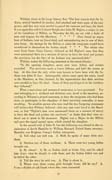
[p. 17]
Whitney states in his large history that "The first reports that the Indians, several hundred in number, had attacked and slain some of the emigrants, and that men were needed to guard the remnant and bury the dead. It was upon this call to Colonel Haight that John M. Higbee, a major in one of the battalions of Militia, on Thursday the 8th, set out with a body of men and wagons for the Meadows. * * * * They found an angry host of Indians, bent on blood-shed, and outnumbering ten to one of their own force. An attempt by the Militia to assist the emigrants would have transferred to themselves the Indian attack * * * The whites who were from Santa Clara County, believed as did Higbee's men, that they were summoned there on a mission of mercy to bury the dead and protect the survivors, but the fury of the Indians was uncontrollable."
Whitney makes the following statement in his recent history:
"In the opening slaughter, seven men were killed, and sixteen wounded. The survivors made a brave defense, and held the enemy at bay. At this time the only white man known to have been with the Indians was John D. Lee. Subsequently others came upon the scene, lured to the Meadows, as they claimed, by the reprsentation that their services were needed to bury the dead. Some of them participated in the butchery that followed."
What a marvelous and unnatural occurrence is here presented. For men belonging to a civilized and christian race, lured to the meadows, according to Whitney's absurd statement, to bury the emigrants who had been slain, to participate in the slaughter of their surviving comrades, is most revolting. No sensible person who may read the two foregoing statements will believe that Whitney believed—that any men were lured to the Meadows, or that "Higbee's men were summoned there on a mission of mercy to bury the dead and protect the survivors," or doubt that they were ordered out to assist in the massacre. Higbee was a Major in the Militia and gave the signal agreed upon, which started the slaughter.
At the second trial of John D. Lee the following was elicted in the examination of Jacob Hamblin by William Howard, United States attorney: Hamblin was Brigham Young's Indian interpreter.
Q. Tell what Lee told you. A. Well, he spoke of many little incidents.
Q. Mention any of those incidents. A. There were two young ladies brought out.
Q. By whom? A. By an Indian chief at Cedar City, and he asked him (Lee) what he should do with them, and the Indian killed one and he killed the other.
Q. Tell the story he told you. A: That is about it.
Q. Where were these young girls brought from; did he say? A. From a thicket of oak brush where they were concealed.
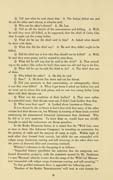
[p. 18]
Q. Tell just what he said about that. A. The Indian killed one and he cut the other one's throat, is what he said.
Q. Who cut the other's throat? A. Mr. Lee.
Q. Tell us all the details of the conversation and killing. A. Well, he said they were all killed, as he supposed; that the chief of Cedar City then brought out the young ladies.
Q. What did he say the chief said to him? A. Asked what should be done with them.
Q. What else did the chief say? A. He said they didn't ought to be killed.
Q. Did the chief say to Lee why they should not be killed? A. Well, he said they were pretty and he wanted to save them.
Q. What did he tell you that he said to the chief? A. That according to the orders [the orders he had] they were too old and big to let live.
Q. What did he say he told the chief to do? A. The chief shot one of them.
Q. Who killed the other? A. He did, he said.
Q. How? A. He threw her down and cut her throat.
Q. Did you ascertain in that conversation, or subsequently, where it was they were killed? A. When I got home I asked my Indian boy and we went out to where this took place, and we saw two young ladies lying there with their throats cut.
Q. What was the condition of their bodies? A. They were rather in a putrefied state; their throats were cut; I didn't look further than that.
Q. What were their ages? A. Looked about fourteen or fifteen.
It was shown by the evidence in Lee's first trial that many of the other victims had their throats cut, but Whitney in treating of those trials avoided mentioning the phenomenal historical occurrences thus disclosed. Why he did so is very apparent. To have done so, would have too vividly brought to mind the endowment cut throat penalties. In the Rocky Mountain Saints, it is stated that the "Wild Cats came as near to them (the Arkansas Company) in traveling as convenient for the grazing of cattle and the purpose of camp at night. Within sight of each other they formed their corrals, but while the one resounded with vulgar songs, boisterous roaring and tall swearing, in the other there was the peace of domestic bliss and conscious rectitude.
Whitney's reference to the foregoing is as follows:
"Impartial history paralleled the assertion that the emigrants conducted themselves properly, with the statement quoted by Mr. Stenhouse (a non-'Mormon' when he wrote) that the camp of the 'Wild Cat' Missourians 'resounded with vulgar songs, boisterous roaring, and tall swearing.'"
To that garbled statement there is appended the following note:
"Readers of the Baskin 'Reminiscences' will look in vain therein for
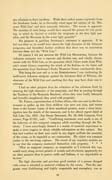
[p. 19]
any allusions to these incidents. While their author quotes copiously from the Stenhouse books, he is discreetly silent upon the subject of the 'Missouri Wild Cats' and their unseemly behavior. The reason is apparent. The mention of such things would have marred the picture he was painting, in which he desired to exhibit the emigrants in the best light possible, and the Mormons in the worst light possible.
His purpose in garbling Stenhouse's statement is apparent. If he had not done so, he would have shown the high character of the Arkansas emigrants, and furnished further evidence that there was no association between them and the "Wild Cats."
Of course I did not mention the Wild Cat Missourians, because the Arkansas company was a separate and distinct one, and wholly disconnected with the Wild Cats, as the quotation which I have made from Whitney's recent history respecting the attack of the Indians on the latter and the quotation from Stenhouse's Rocky Mountain Saints, conclusively show.
This being the case and as in my Reminiscences I was vindicating the inoffensive Arkansas emigrant against the infamous libel of Whitney, the character of the Wild Cats and anything that they may have done was irrelevant.
I had no other purpose than the refutation of his infamous libel, by showing the high character of the emigrants, and that in passing through the Territory to the Mountain Meadows, where they were foully betrayed, and brutally slaughtered, they acted with propriety.
Mr. Forney, superintendent of Indian affairs, who was sent by the Government to gather up thte little children who were not slain, and return them to the former homes of their murdered parents, made a close investigation into the details of the massacre, and in his official report dated at Salt Lake City, 1859, (See Senate Document, No. 42, 36th Congress, First session, Page 87-88), said: "Conflicting statements were made to me of the behavior of this emigrant company while traveling through the Territory. I have accordingly deemed it a matter of material importance to make a strict inquiry to obtain reliable information on this subject. Not that bad conduct on their part could in any degree palliate the enormity of the crime, or be regarded as any extenuation. My object was common justice to the surviving orphans. The result of my inquiries enables me to say that the company conducted themselves with propriety. * * *
"That an emigrant company, as respectable as I believed this was, would carry along several pounds of arsenic and strychnine, apparently for no other purpose than to posion cattle and Indians, is too improbable to be true."
The high character and previous good conduct of a person charged with crime is admitted as material evidence by the courts. That the emigrants were God-fearing and highly respectable and exemplary, was so
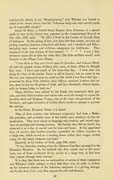
[p. 20]
conclusively shown in my "Reminiscences," that Whitney was forced to admit in his recent history that the "Arkansas emigrants were mainly made up of respectable people."
James H. Berry, a United States Senator from Arkansas, in a speech made by him in the Smoot case, reported in the Congressional Record of Feb. 12th, 1907, said: "In 1857, I lived in the County of Carroll, State of Arkansas. In the spring of that year there left that county, and two adjoining counties, between a hundred and forty, and a hundred and fifty—including men, women and children—emigrants for California. They consisted of the best citizens of that country * * * * * I was a boy, seventeen years old on that day when they (the little children saved) were brought to the village Court House.
"I saw them as they were lined upon th ebenches, and Colonel Mitchell told the people whose children they were, at least, whose he thought they were. I have seen much of life since that day. I have seen war along the lines of the border States in all its horror; but no scene in my life was ever impressed upon my mind as that which I saw there that day— presented by those little children, their fathers, mothers, brothers and sisters, dead on the far off plains of Utah, and they absolutely without means, with no human being to look too."
Those children were robbed by the fiends who massacred their parents, and their little brothers and sisters who were old enough to expose the horrible deed and Brigham Young, who at the time was governor of the Territory, and superintendent of Indian affairs made no attempt to prevent the outrage.
In the Rocky Mountain Saints it is stated:
"One of their number (the Arkansas emigrants) had been a Methodist preacher, and probably most of the adults were members of that denomination. They were moral in language and conduct, and united regularly in morning and evening prayers. On Sunday they did not travel ,but observed it as a day of sacred rest for man and beast. At the appointed hour of service, this brother-preacher assembled his fellow travelers in a large tent, which served as a meeting house within their wagon circled camp, for the usual religious exercises."
Bancroft, in his history of Utah, page 550, states:
"It was Saturday evening when the Arkansas families encamped at the Mountain Meadows. On the Sabbath day they rested, and at the usual hour, one of them conducted divine service in a large tent, as had been their custom through their journey."
It is clear that there was no conjunction of action of those companies and Whitney's futile attempt to show that there was, in order to bolster up his infamous slander of the Arkansas emigrants is a glaring outrage, and he has done it in a way that exposes his self stultification.
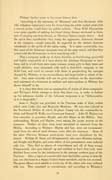
[p. 21]
Whitney further states in his recent history that:
"According to the testimony of 'Mormons' and Non-'Mormons' alike (the Arkansas emigrants) were far from being the white souled saints that a certain writer would have the public believe. Those Wild Missourians were quite capable of making the blood thirsty threats attributed to them, and of carrying out those threats, as 'Mormon' history amply shows. And the spirit they manifested—they being the aggressive, dominant element in the company—would naturally be regarded by the settlers, however mistakenly as the spirit of the entire camp. It is quite conceivable, too, that some of the Arkansas emigrants were of the same mood, and that they joined with the Missourians in their tantalizing talk."
That a company made up of thirty families, as God-fearing, prayerful and highly respectable as I have shown the Arkansas Emigrants to have been, and in which there were many women, young girls in their teens and small children, were associated with such a disorderly company as the Wild Cats, and acted in concert with them in perpetrating the outrages charged by Whitney, is too extraordinary and improbable to admit of belief. And, most certainly will not be given credence on the uncorroborated statement of a historian as reckless and unscrupulous as Whitney has shown himself to be.
It is clear that there was no conjunction of action of those companies, and Whitney's futile attempt to show that there was, in order to bolster up his infamous slander of the Arkansas emigrants is as "dishonorable, as it is despicable."
Isaac C. Haight was president of the Parowan stake of Zion, within which were Cedar City and Mountain Meadows. He was also Colonel in the Territorial Militia of which Brigham Young was the commander-in-chief, and Daniel H. Wells, was Lieutenant General. John M. Higbee was first counselor to president Haight, and also Major in the Militia. Notwithstanding, Haight and Higbee, were among the prime movers of the massacre. Neither of them were court martialed or removed from the Militia. According to Whitney—Higbee and Lee, were not excommunicated from the church until thirteen years after the massacre. None of the other fifty-two Mormon participants were ever disciplined by the church. William H. Dame and Klingensmith, who were Mormon bishops and Haight and Higbee, and some others of less prominence, were indicted with Lee. They fled to places of concealment and all of them except Klingensmith, who gave himself up and testified in Lee's first trial, were shielded from arrest by the inhabitants in the extreme southern part of the Territory. After a lapse of considerable time the hidden retreat of John D. Lee, was disclosed to a deputy United States marshall, and he was arrested. The peace officers were unable to arrest any of the others who were indicted with Lee. They remained in concealment, and according to Whitney's
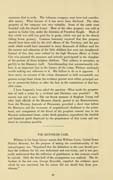
[p. 22]
statement died in exile. The Arkansas company must have had considerable money. What became of it has never been disclosed. The other property of the company was very valuable. Some of the cattle were branded with the church brand. Most of the other property was sold at auction in Cedar City, under the direction of President Haight. Much of that which was sold was paid for in grain, which was put in the church tithing house granary. Common humanity required that that property should have been sold by the civil officers of the Territory, and the proceeds which would have amounted to many thousands of dollars used for the nurture and education of the little children that were not slaughtered. Instead of this, they were robbed by the high Mormon official at Cedar City who planned the massacre and actively participated in the slaughter of the parents of those helpless children. That robbery is secondary in perfidy to the Massacre itself. Notwithstanding that unconscionable robbery is an important fact in the history of the crime, Whitney studiously avoids making any reference to it. His failure to do so is apparent. I have never, on account of the crime, denounced or held accountable any persons except those whom the evidence proved were either principal actors or accessories before or after the fact, in the commission of that horrible crime.
I have frequently been asked the question—What made the perpetration of such a crime by a civilized and Christion race possible? My answer was and is now—The cut throat sermons of Brigham Young and other high officials of the Mormon church, quoted in my Reminiscences, from the Mormon Journals of Discourses, preached a short time before the Massacre, and the covenants of unquestioned obedience to the priesthood, and avengement of the blood of the prophets entered into in the Mormon endowment house, under death penalties, engendered the fiendish and fanatical spirit displayed by the perpetrators of that crime and rendered its execution possible.
THE REYNOLDS CASE.
Whitney in his large history asserts that William Carey, United States District Attorney, for the purpose of testing the constitutionality of the anti-polygamy law, "Stipulated that the defendant in the case should produce the evidence for his own indictment and conviction, and it was generally understood that the infliction of punishment in this instance would be waived. Only the first half of the arrangement was realized. The defendant in the test case, George Reynolds, supplied the evidence upon which he was convicted, but his action did not shield him from punishment."
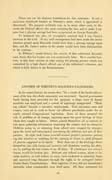
[p. 23]
There was not the slightest foundation for that statement. It was a malicious falsehood framed in Whitney's mind, which I apprehend is disordered. His purpose evidently was, as in many other cases, to discredit the Federal officers who were executing the law, and to make it appear that a glaring outrage had been perpetrated on George Reynolds.
To besmirch me, also, he wrongfully asserted that I was Carey's assistant in the trial. If any such arrangement had been made the severe sentence passed upon Reynolds would have been a glaring outrage upon him, and Mr. Carey's action in the matter would have been dishonorable in the extreme.
In Whitney's recent history, his version of that celebrated Reynolds case, shows that his former one was maliciously false. He is careful however, in that later version, to omit stating the glaring perjury which was committed by a high church official, one of the defendant's witnesses, and which is fully shown in my Reminiscences.
ANOTHER OF WHITNEY'S MALICIOUS FALSEHOODS.
In his recent history, he asserts that, "As a result of the harsh enforcement of the law, the whole community was terrorized. Special government funds having been provided for the purpose, a large force of deputy marshals was employed and a system of espionage inaugurated. "Hunting cohabs" became a lucrative employment. Paid informers men and women, were set to work to ferret out offenses punishable under the recently enacted Congressional legislation. Some of these assumed the role of peddlers or of tramps, imposing upon the good feelings of those whom they sought to betray. Others passed themselves off as tourists intent upon gathering information respecting the country and its resources. Children going to, or returning from school were stopped by strangers upon the street and interrogated concerning the relations and acts of their parents. At night dark forms prowled around people's premises, peering ing into windows or watching for the opening of doors, to catch glimpses of persons supposed to be inside. More than one of the hirelings thrust themselves into sick rooms and women's bed chambers, rousing the sleepers, by pulling the bed clothes from off them. If admittance was refused, houses would be broken into. Delicate and refined women, about to become mothers, or with infants in arms, were awakened at unseemly hours and conveyed long distances through the night, to be arraigned before United States Commissioners. Male fugitives, if they did not immediately surrender when commanded, were fired upon. All these statements are
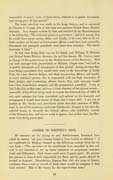
[p. 24]
susceptible of proof; many of them being referred to in public documents and newspapers of that period."
The same assertion was made in his large history, and is answered by Charles S. Varian, who at that time was assistant United States District Attorney. In a chapter written by him and attached to my Reminiscences is the following: "The historian gives no particulars—and it is certain that he would have given names, dates, and details, if he were able to do so. Such conduct on the part of Government officers would have been generally denounced and promptly punished—had there been occasion. The entire statement is false."
At that time Judge Zane was on the bench, and William H. Dickson was United States District Attorney, he and his deputy, Mr. Varian, were in charge of the prosecutions in the district courts of the Territory. Had any such outrages been perpretated, as Whitney alleges were "referred to in public documents and newspapers of that period," during the time they were being committed, they would have come to the knowledge of Judge Zane,' the other District Judges, and those prosecuting officers, and would, as every unbiased person who is acquainted with the high characters of those Judges, and prosecuting officers, knows that, such outrages would have been immediately stopped, and the perpetrators punished. I was in Salt Lake City at that time, and was a close observer of the current events— especially of the efforts being made to execute the Edmunds law of 1882. If any such outrages had been committed and noticed in the Journals and newspapers I would have heard of them, but I never did! I am not as modest as Mr. Varian and possitively assert that that assertion of Whitney's is one of his numerous malicious falsehoods—framed in his own disordered brain, to discredit the federal officers who faithfully executed the Edmunds law, and also to make it appear, that at that time, the Mormons were being persecuted.
ANSWER TO WHITNEY'S NOTE.
He censures me for stating in my Reminiscenes, historical facts which he asserts, "all good citizens desire to have buried in oblivion." I am vindicated by Whitney himself in the following excerpt from his recent book. "The narration of the unpleasant facts recorded in this volume is not intended to stir up bitter memories or perpetuate senseless feuds and differences. Such events could never happen again. No present day person or class is held responsible for them, and by gones, should be treated as bygones. Nevertheless, happen they did—the page of history condemns them—and no record of those times would be complete if they were omitted. This is the reason for the reproduction here."
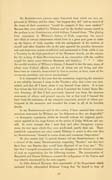
[p. 25]
My Reminiscences contain many historical facts which are very unpleasant to Whitney and his class, "but happen they did" and no record of the times of their occurrence "would be compete if they were omitted." Because they were omitted by Whitney and for the further reasons stated in the preface to my Reminiscenes which follows. I stated them: "The glaring false statements in Whitney's history of Utah, respecting the nature and effect of certain occurrences which have in a great part gone to make up the history of Utah, together with his malignment of the motives of myself and other Gentiles who in the past opposed the peculiar theocratic and anti-American system established and maintained in Utah, while it was a Territory by the high priesthood of the 'Mormon' church, are the reasons for the writing of these Reminiscences of my connection with the conflict waged for many years between Mormons and Gentile.s * * * After the careful scrutiny of Whitney's history, I deemed it due the men, many of whom were Federal officials and few of whom are yet living and who have been so wantonly besmirched by him to correct, at least, some of his erroneous assertions and covert insinuations."
It is insinuated in that note that my statements respecting the massacre is not reliable, because I came to the Territory after that crime was committed, and that all I know about it was learned from others. It is true that before the first trial of Lee, at which I assissted the United States District Attorney, all that I had previously learned was from the unsworn statements of others, and printed reports, but at that trial I learned the facts from the testimony of the witnesses examined, several of whom participated in the massacre and revealed the crime in all of its horrible details.
In my Reminiscences and in this review, I have asserted that certain atrocious statements by Whitney are "as dishonest as they are despicable" —a derogatory expression which he himself without the slightest justification applied in his large history to the action of Judge McKean and myself. In every instance that I used that, and other derogatory expressions, the text upon which they were predicated, justify their use. Those justifiable expressions are what caused Whitney to assert in that note that my Reminiscences "abound in coarse abuse and venomous vituperation.'
He also asserts that "a special feature (of my Reminiscences) is the a revival of the musty Munchausenism respecting "Danites" and that had there been any Danites they would have disposed of me long ago." The fact that I escaped assassination does not disapprove the former existence of such an organization, for the following reasons. The assassination of Brassfield and Doctor Robinson aroused the indignation of the Nation and was bitterly denounced by the news papers.
In 1866, General Sherman, then commander of the Department which included Utah, telegraphed Brigham Young that "he hoped to hear of
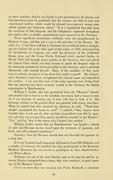
[p. 26]
no more murders; that he was bound to give protection to all citizens and that murderers must be punished; that the country was full of tried and experienced soldiers which would be pleased to avenge any wrong committed against any American citzen." It is a significant fact that since the reception of that telegram, and the indignation expressed throughout the country that no similar assassinations have occurred in the Territory.
Those significant occurrences evidently, were not misunderstood by Brigham Young, and they put a stop to the activities of the Danites. Besides this—I had done nothing to displease the priesthood before draughting the Cullom bill in the latter part of the winter of 1869, and procuring its introduction in Congress, and until the discovery of the celebrated Emma mine, and the Union Pacific Railroad which reached Ogden, in March 1869, had brought many gentiles to the Territory who had joined the Liberal Party which had been formed to ablish the despotic reign of the theocratic priesthood which prevailed in the Territory, and to establish democratic rule instead thereof. Many of the members of that party were as actively striving to bring about that result as myself. My assassination therefore would have strengthened the Liberal cause and intensified the conflict. I am sure that none of the early apostates now living think that my assertion that there formerly existed in the Territory the Danite organization is Munchauserin.
William S. Gobde, who had apostatized from the "Mormon" church, and started what is known as the Gobdeite movement, had a house to rent. As I was desirous of renting one, I went with him to look at it. His bedroom window on the ground floor was guarded with strong iron bars. When he noticed that they attracted my attention, he said, "Those bars should recommend this house to you!" I replied—"they express more forcibly than words can do, that you have jeopardized your life by apostacy and that you are guarding against murderous assaults by the Danites." "Yes," said he, "that is the reason why I barred that window."
Whitney further asserts that my Reminiscences "are largely a rehash' of stale anti-Mormon stories, based upon the testimony of apostates, jail birds, and self-confessed murderers."
Apostacy from the Mormon church does not discredit the apostate by a long shot.
It is true I gained much important information from Bill Hickman and a number of witnesses who testified that they participated in the Mountain Meadows Massacre, but was forced to participate by their church leaders and Militia officers.
Hickman was one of the chief Danites, and at the time he and his associate Danites committed their crimes, they were members, in good standing, of the Mormon Church.
I have on more than one occasion seen Porter Rockwell, a notorious
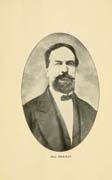
[p. unnumbered]
BILL HICKMAN
A black and white portrait of Bill Hickman.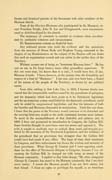
[p. 27]
Danite and drunkard partake of the Sacrament with other members of the Mormon church.
None of the fifty-two Mormons who participated in the Massacre, except President Haight, John D. Lee and Klingensmith, were excommunicated or disfellowshiped by the church.
The testimony of criminals is entitled to credence when corroborated by creditable witnesses and circumstances.
My Reminiscences contain no doubtful facts.
Any unbiased person who reads the evidence and the quotations from the sermons of Orson Hyde and Brigham Young contained in the chapter of my Reminiscences on the subject of the Danites will not doubt that such an organization existed and was active in the earlier days of the Territory.
Whitney accuses me of being an "inveterate Mormon hater." He has cast on me, in his large history many other groundless aspersions. If this one were true, (he knows that it is not), I would have few, if any, Mormon friends. I have, however, at the present time the friendship and respect of a host of "Mormons." I am now, and ever have been, a friend of the masses of the people of the Territory, as shown by my political career.
Soon after settling in Salt Lake City, in 1865, I became firmly convinced that the irrepressible conflict caused by the prevalence of polygamy and the immunity which had been given to it by Territorial legislation and the un-American system established by the theocratic priesthood, could only be ended by congressional legislation, and that the interests of both the Gentiles and Mormons demanded its termination. Until this was done, I knew that the peace of the Territory would continue to be disturbed and the existing bitterness would as the strife continued, become more intense. To assist in the accomplishment of that desirable and salutary end, in 1869, I drew and procurred its introduction in Congress, the Cullom Bill. Some Gentiles thought its provisions were too severe and opposed it. The evils it sought to eradicate were so radical, deep seatd, and strongly protected by the measures of the Territorial Legislature, and the influence of the priesthood that no provisions less stringent than the Cullom Bill would have had much if any, effect. The lapse of time, their enactment by Congress, and their enforcement has shown the wisdom and necessity of those provisions. When George Q. Cannon and I were opposing candidates for the office of Territorial delegate to Congress, because I was advocating the Cullom Bill, he charged me with being an enemy of the Mormon community. I replied to that false charge, "My alien antagonist (George Q. Cannon) has stated to the Mormon community that I am their worst enemy. I assure the Mormon people I am not their enemy, but their friend. I claim no rights or privileges for myself, as an American
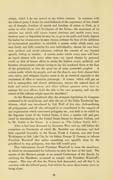
[p. 28]
citizen, which I do not accord to my fellow citizens. In common with the Liberal party I desire the establishment of the supremacy of law, freedom of thought, freedom of speech and freedom of action in Utah, as it exists in other States and Territories of the Union; the enactment of an election law which will insure honest elections and enable every man, however poor or dependant he may be, to go to the polls and freely deposit his ballot for whomsoever he may choose, without the fear of the infliction of ecclesiastical penalties; to establish a system under which every one may freely and fully exercise his own individuality, choose his own business, politcal and social relations, without the consent of any bigoted apostle, bishop or teacher. A system under which every man will have an equal chance with every other man—an equal chance by personal worth or dint of honest effort to attain the highest social, political, and business advancement without having to lay his manhood down at the foot of the priesthood, or kiss the great toe of some pretended prophet. A system under which the people, and not the church, may frely choose their own rulers, and religious bigotry cease to be an essential requisite to the attainment of office or business patronage. A system which will put an end to monopolies and church artistocracy, restore the natural laws of trade and social intercourse, and allow without question every man to manage his own affairs, hold the title to his own property, and run the course of life without weight upon his shoulders."
As the Mormon priesthood after the stringent legislation by Congress continued to be recalcitrant, and after the act of the Idaho Territorial legislature, which was introduced by Col. Wall of this city, disfranchising all polygamists, and all who belonged to or contributed to the support of any organization which sanctioned polygamy etc., was held to be vailid by the Supreme Court of the United States, I drew a similar bill and procured its introduction in the United States Senate by Senator Cullom, and by Mr. Stuble in the House. It is known as (The Cullom Stuble Bill.)
After it had been discussed by Governor West and my self before the committee on Territories of which Mr. Strubble was chairman, and had been reported favorably to the House, Frank J. Cannon, was sent from Washington to Salt Lake City by his father, George Q. Cannon, to inform President Woodruff that unless something was speedily done by the priesthood to stop polygamy, that that bill would pass.
That information forced President Woodruff to issue the manifesto, in which he recommended his followers to obey the laws of the land. The masses of the Mormon people at an annual Conference of the church, by ratifying the Manifesto, promised to comply with President Woodruff's request. This was all that the Nation had demanded, and all that I, in common with the Liberal party, had striven for more than twenty years to bring about.
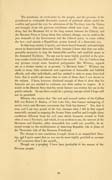
[p. 29]
The manifesto, its ratification by the people, and the promise of the priesthood to relinquish theocratic control of political affairs ended the conflict and paved the way for admission of the Territory into the Union, and brought about the glorious conditions which now exist. The only thing that the Mormons did in the long contest between the Liberal, and the Mormon Party to bring about that salutary change, was to yield to the just demands of the Government and the Liberal party, to come within the law—and sustain a Republican system instead of a theocratic one.
In that long contest, I openly, and above board honestly and untiringly strove to Americanize theocratic Utah; because I knew that that was indispensably necessary to stop the lamentable conflict and establish peace in the distracted Territory. No one can be more highly gratified at the glorious results which have followed, than I am myself. Nor do I believe that any persons except some fanatical polygamists like Whitney, regards me as a former enemy or at present, "a, Mormon hater." Whitney has made so many false statements and aspersions of honorable and faithful officials, and other individuals, and has omitted to state so many historical facts, that it would take more time to treat of them, than I can devote to the subject. I have, however, disclosed enough of them to show that his histories are not entitled to credence, nor their author to respect. It is stated in the Deseret News that his recent history was written for use in the public schools. Its use there would be a glaring outrage which I hope will not be permitted.
Whitney also asserts that "the real and avowed author of the Cullom Bill was Robert N. Baskin, of Salt Lake City, that human mainspring of nearly every anti-Mormon movement that Utah has known." Yes, that is true, and I am very proud of the fact, because what I did in that regard materially assisted in stopping the former bitter conflict and brought about conditions different from the evil ones which formerly existed in Utah when it was a Territory, and which, it was evident to me, the interest of the Mormons and Gentiles, alike, demanded, but could not, possibly, be attained except by the establishment of American Republic rule in place of the Theocratic rule of the Mormon Priesthood.
The change to new conditions brought about is an unqualified blessing, and I again assert that no one can be more highly gratified on account its' occurance than I am myself,
Though not a prophet, I have been profitable to the masses of the Mormon people.